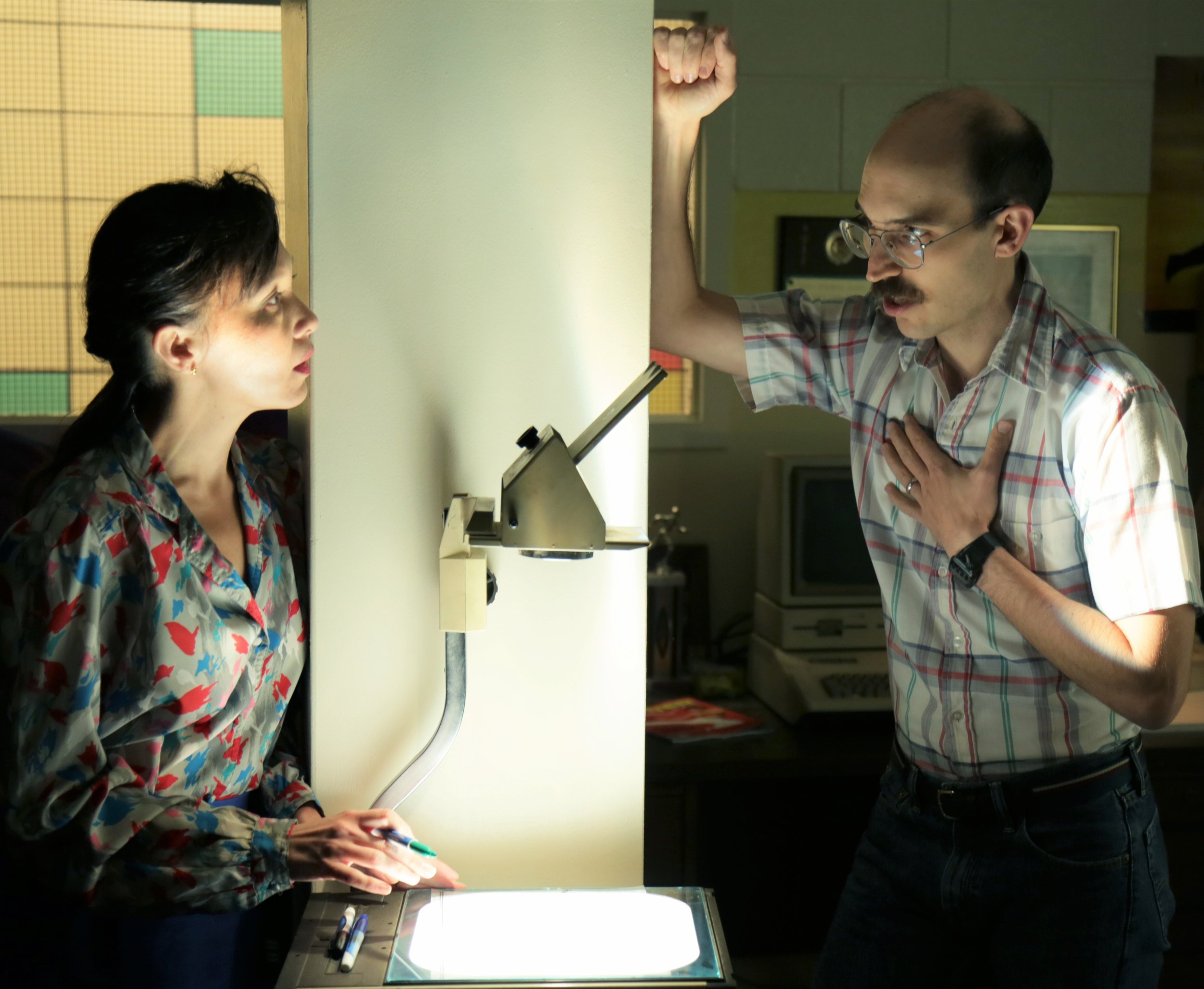Miles for Mary, the sly new work at Playwrights Horizons, has a lengthy writing credit: “Written by Marc Bovino, Joe Curnutte, Michael Dalto, Lila Neugebauer and Stephanie Wright Thompson in collaboration with Sarah Lunnie and the creative ensemble of Amy Staats & Stacey Yen.” That credit may be accurate, but it’s also a wink at the audience. Miles for Mary is a comedy about a committee at a high school, and, defying dire axioms about things done by committee, it’s a hoot.
Mary opens with the members, played by six of the creators—Neugebauer is the director, and Lunnie is the dramaturg—through a year, from the review of the 1988–89 budget to the planning of the 1989–90 one, by a high school panel of educators. The chief event of the year is a marathon/pledge drive named for Mary Crane, a student who died nine years earlier. And even though the play may be self-reflexive, it follows the dynamics of collaboration with a keen ear and shrewdly observant humor.
Stacey Yen (left) is Julie and Marc Bovino is her husband, Ken, in The Mad Ones’ production of Miles for Mary. Top: Yen and Bovino with Joe Curnutte as gym teacher Rod.
At the initial meeting, the chair, Brenda, is on the phone, apparently following an accident. Staats, whose part is mostly voice, nevertheless captures the ennui of a committee person who has been in the job too long. “Additional refreshments for Jack…. You know what we’re talking about,” she says, ticking off the expenses. “Um, it’s fine, it’s how it is.” It’s a canny move to let the listener fill in the blank.
The newest member of the committee, Julie (Yen) is excited about the coming year. “How about adding some goals?” she suggests. The committee agrees and votes to “do more.” Rod (Curnutte), a gym teacher, hangs a sign: DO MORE.
Under Neugebauer’s direction, the actors give sharply detailed performances. Curnutte makes the trope of “dumb jock” fresher than one might expect. Ken (Bovino), who is Julie’s husband, teaches a film studies course, but can’t operate two cameras at once. Another gym teacher, Sandra (Thompson), is full of energy; she gets up early to run with David (Dalto), the peacemaker standing in for Brenda. But what’s not said is equally important—e.g., the mystery of Jack’s “refreshments,” the cause of Brenda’s injuries, trivial moments—and creates a sense of real lives bubbling away outside the room.
The script is canniest, though, in its examination of petty bureaucracy, as the committee members strain to avoid conflict. They pussyfoot around hot topics and trade platitudes to avoid pressing one another’s buttons; but the year progresses (a Christmas party with gifts unwrapped is particularly amusing), and conflicts do flare up. When Sandra and Rod talk up the idea of having their star wrestler, Chooch, “do more” (in addition to dressing as Atlas and running the marathon), Ken suggests it might be better to have Chooch do an interview. Sandra and Rod reject the idea. Explaining why physical feats are better, Sandra says, “You don’t have to talk.” Ken becomes irritated, and Julie jumps in to keep the peace.
Julie: I honestly don’t think you guys are disagreeing right now. I think you agree that—
Rod: Well, I don’t need to be naysayed.
Julie: Excuse— I’m not naysaying.
Rod: Sounded like you were. Naysaying. It really did. It really, really did.
Bovino has a masterly scene in which he tries to train the others in new telephones he has procured, but the others bicker and undermine his presentation, leading to an unexpected outburst. Yen also has a highly emotional moment as Julie tries to wriggle out of spending four hours fielding calls in the telethon.
From left: Stephanie Wright Thompson as Sandra, Bovino, Michael Dalto as David, Yen and Curnutte. Photographs by The Mad Ones.
The detail of this satire—reflected, too, in Amy Rubin’s scenery, from the perforated wall tiles to a food pyramid chart to molded-plastic chairs in a stack—is impressive. Even Dalto’s David, inhabiting the least flashy part, provides a steady calm that every committee needs: he’s always tabling, or setting aside, or “circling back” to avoid troublesome topics.
Miles for Mary may deal in particulars, but it has a broader resonance. It suggests that avoiding conflict can be as wrongheaded as confronting it and that political correctness can lead to as much injury as forthright disagreements. And it ends with a final irony: all the petty squabbles in one’s life may be put into perspective by events that can’t be controlled. Miles for Mary is not only about a group in small-town Ohio. It’s a parable of civilization.
The Mad Ones’ production of Miles for Mary plays through Feb. 25 at Playwrights Horizons (416 W. 42nd St., between Ninth and Tenth avenues.) Evening performances are at 7:30 p.m. Tuesday through Saturday, and at 7 p.m. on Sunday. Matinees are at 2 p.m. on Saturday, with an additional matinee on Feb. 25 at 2 p.m. Tickets cost $20-$75 and may be purchased by calling (212) 279-4200 (noon-8 p.m. daily) or online at phnyc.org.





